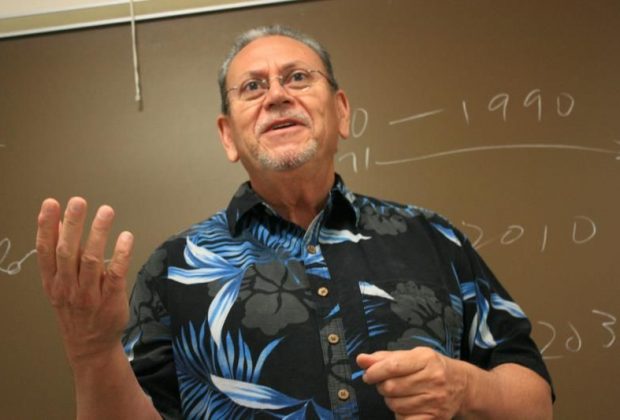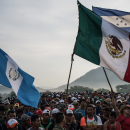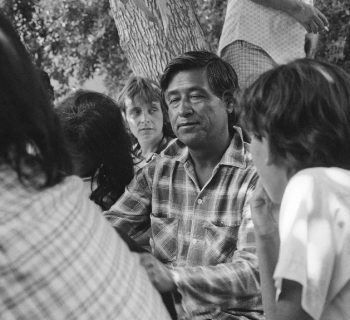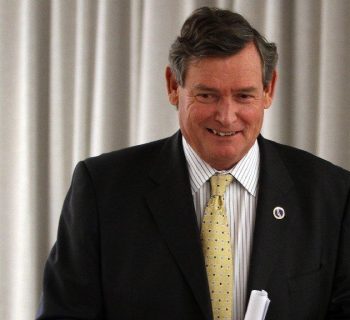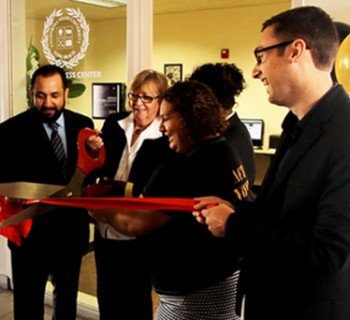By :Luis Uribe ~ EFE News Agency ~ March 28, 2019
Los Angeles, Mar 28 (EFEUSA) .- The FBI monitored the peasant leader César Chávez and other representatives of the Chicano movement in the 1960s and 1970s, reports a well-known Mexican-American scholar who has collected information on the subject for more than 40 years.
The lawyer José Ángel Gutiérrez, professor emeritus of the University of Texas at Arlington and who founded the Center for Mexican American Studies there, said in an interview with Efe that the interest of the surveillance by the federal investigation agency was to destroy the union movement of Chávez.
"The FBI was not investigating crimes or criminal conduct on the part of César Chávez and his followers, they were doing that as an excuse to destroy the union," says the scholar, author of the book "The Eagle Has Eyes."
Chávez co-founded the United Farm Workers Union (UFW) in the 1960s, the most powerful agricultural union in the country and from which they demanded better wages and conditions for the peasants.
One of the milestones of their union struggle was the strike of grape pickers in Delano, California, which began in September 1965, lasted for years and served, for the first time, peasants of different origins - Filipinos, Chinese and Mexicans - join in a common front.
Gutiérrez's recently published book is based on "thousands of documents" obtained by Gutiérrez through the Freedom of Information Act (FOIA).
And the peasant leader was one of many who have been investigated by the federal government in American history, says the scholar, stating that he has "documents from more than three dozen people and organizations."
Indicates that since 1976, "by discipline", seeks information and has documents that confirm the government's research to personalities such as the Mexican writer Carlos
Fuentes and groups such as the League of United Latin American Citizens (LULAC), the oldest Hispanic organization in the country.
The lawyer José Ángel Gutiérrez, professor emeritus of the University of Texas at Arlington and who founded the Center for Mexican American Studies there, said in an interview with Efe that the interest of the surveillance by the federal investigation agency was to destroy the union movement of Chávez. EFE / Archive
"After getting into this field and obtaining documents from the FBI, I came to the conclusion that people of Mexican origin are the historic enemy of the government," adds Gutiérrez, who was a founding member of the Mexican-American youth organization (MAYO), as well as as founder and president of the political party of Mexican-American Raza Unida.
For this reason, for this academic it is not at all strange the surveillance denounced this year against activists and lawyers who defend the interests of the undocumented who wait in Mexico to request asylum in the US, as well as the journalists who cover the news about this matter.
"Now is a very critical moment in which we have to think and reflect on our actions, but that does not mean staying quiet," he says.
Gutierrez will make a presentation of his book on Sunday, March 31, at César Chávez Elementary School in Long Beach, at an event in memory of the peasant leader, precisely on the day of César Chávez Day.
Gutierrez is one of the defenders of the idea that an important part of the US territory such as California and Texas that previously belonged to Mexico should return to Mexican hands if it had the necessary political force.
For that activism, he says, he has also been investigated by the FBI and that once he managed to obtain the documents through FOIA, he could verify that "it was not paranoia".
In addition to being part of and leading different community activism organizations, Gutiérrez was named special advisor to the Presidency of the University of Texas at Arlington between 1996 and 1998.
He has also served as president of the Crystal City Independent School District, city commissioner of that city in Texas, judge of Zavala County, commissioned by Oregon to the International Trade Commission, judge of the city of Dallas and member of the Commission of ethics of that Texan city.
While Chavez was watched closely, they took pictures of people who went to their meetings, looked for fingerprints, "now things have changed" and it is the people themselves who are giving their information.
"When you shop with credit cards, when we talk on the phone, when we go out and cameras enter everywhere recording your image and your voice," he warns.
Source:Luis Uribe ~ EFE News Agency ~ March 28, 2019
_____________________________________________________________________________________________________
El FBI vigiló a César Chávez y a otros líderes chicanos, denuncia académico
Los Ángeles, 28 mar (EFEUSA).- El FBI vigiló al líder campesino César Chávez y a otros representantes del movimiento chicano en las décadas de 1960 y 1970, denuncia un reconocido académico mexicoestadounidense que durante más de 40 años ha recopilado información sobre el tema.
El abogado José Ángel Gutiérrez, profesor emérito de la universidad de Texas en Arlington y quien fundara allí el Centro para Estudios México Americanos, asegura en entrevista con Efe que el interés de la vigilancia por parte de la agencia federal de investigaciones era destruir el movimiento sindical de Chávez.
"El FBI no andaba investigando crímenes ni conducta criminal por parte de César Chávez y sus seguidores, estaban haciendo eso como excusa para destruir el sindicato", dice el académico, autor del libro "The Eagle Has Eyes".
Chávez cofundó en la década de los 60 el Sindicato de Trabajadores del Campo Unidos (UFW, en inglés), el sindicato agrícola más poderoso del país y desde el que reclamaron mejores sueldos y condiciones para los campesinos.
Uno de los hitos de su lucha sindical fue la huelga de recolectores de uvas de Delano (California), que empezó en septiembre de 1965, se extendió durante años y sirvió para que, por primera vez, los campesinos de diferentes orígenes -filipinos, chinos y mexicanos- se unieran en un frente común.
El libro de Gutiérrez, recientemente publicado, se basa en "miles de documentos" obtenidos por Gutiérrez a través de la Ley por la Libertad de la Información (FOIA).
Y el líder campesino fue uno de los muchos que han sido investigados por el Gobierno federal en la historia estadounidense, asegura el académico al afirmar que tiene "documentos de más de tres docenas de personas y organizaciones".
Indica que desde 1976, "por disciplina", busca información y tiene documentos que confirman la investigación del Gobierno a personalidades como el escritor mexicano Carlos Fuentes y grupos como la Liga de Ciudadanos Latinoamericanos Unidos (LULAC), la organización hispana más antigua del país.
"Después de meterme en este campo y de obtener documentos del FBI llegué a la conclusión de que las personas de origen mexicano somos el enemigo histórico del gobierno", agrega Gutiérrez, quien fuera miembro fundador de la organización de juventud mexicoamericana (MAYO), así como fundador y presidente del partido político de mexicoestadounidenses Raza Unida.
Por ello, para este académico no es nada extraño la vigilancia denunciada este año contra activistas y abogados que defienden los intereses de los indocumentados que esperan en México para pedir asilo en EE.UU., así como los mismos periodistas que cubren las noticias sobre esta materia.
"Ahora es un momento muy crítico en el que tenemos que pensar y reflexionar sobre nuestras acciones, pero eso no significa quedarnos callados", asegura.
Gutiérrez hará una presentación de su libro el domingo 31 de marzo en la Escuela Elemental César Chávez de Long Beach, en un evento en memoria del líder campesino precisamente en el día que se celebra el Día de César Chávez.
Gutiérrez es uno de los defensores de la idea de que una parte importante del territorio estadounidense como California y Texas que antes perteneciera a México debería volver a manos mexicanas si se tuviera la fuerza política necesaria.
Por ese activismo, asegura, él mismo también ha sido investigado por el FBI y que una vez que logró obtener los documentos a través de FOIA pudo comprobar que "no era paranoia".
Además de formar parte y liderar diferentes organizaciones de activismo comunitario, Gutiérrez fue nombrado asesor especial a la Presidencia de la Universidad de Texas en Arlington entre 1996 y 1998.
También se ha desempeñado como presidente del Distrito Escolar Independiente de Cristal City, comisionado urbano de esa ciudad en Texas, juez del condado de Zavala, comisionado por Oregón a la Comisión de Comercio Internacional, juez de la ciudad de Dallas y miembro de la Comisión de ética de esa ciudad texana.
Mientras que a Chávez lo vigilaban de cerca, tomaban fotos de las personas que iban a sus reuniones, buscaban huellas digitales, "ahora las cosas han cambiado" y es la gente misma la que está entregando su información.
"Cuando uno hace compras con las tarjetas de crédito, cuando hablamos por teléfono, cuando salimos a la calle y las cámaras entran en todas partes grabando tu imagen y tu voz", advierte.
"Ahora la juventud no se quita de Facebook y de Twitter voluntariamente están entregando todo lo que hacen y con quién lo hacen y cuántas veces lo hacen y esas son cosas muy serias para el futuro", dice.
Por ello, su mensaje a los activistas actuales es que deben de "cuidarse" porque seguro van a estar "bajo vigilancia".
Sin embargo, eso no significa renunciar a defender los derechos.
"Esto es una espada de dos filos: el hecho de que nos estén vigilando no quiere decir que seamos inútiles y no hagamos nada. Si sabemos que nos están investigando, pues no demos toda la información", recomienda.
El abogado José Ángel Gutiérrez, profesor emérito de la universidad de Texas en Arlington y quien fundara allí el Centro para Estudios México Americanos, asegura en entrevista con Efe que el interés de la vigilancia por parte de la agencia federal de investigaciones era destruir el movimiento sindical de Chávez. EFE/Archivo

